Research Proposal: Ethical Considerations in Child Mental Health Care
VerifiedAdded on 2022/08/27
|10
|1940
|30
Report
AI Summary
This report presents a comprehensive research proposal focused on the ethical considerations in providing mental health care to children. The study aims to analyze the factors that influence the treatment, including cultural factors, and to explore the ethical implications of mental health treatment for children. The research employs a qualitative methodology, including interviews with family members, to gather data on their experiences with child mental health services. The proposal outlines the research questions, objectives, data collection methods, and data analysis techniques. It also addresses ethical issues, such as informed consent and confidentiality, and provides a Gantt chart outlining the research timeline. The expected outcome is to identify crucial factors for ethical consideration and to understand the role of cultural attributes in providing effective mental health care to children, addressing gaps in existing research that primarily focuses on adult mental health. The research seeks to provide insights into how to improve mental health care for children.
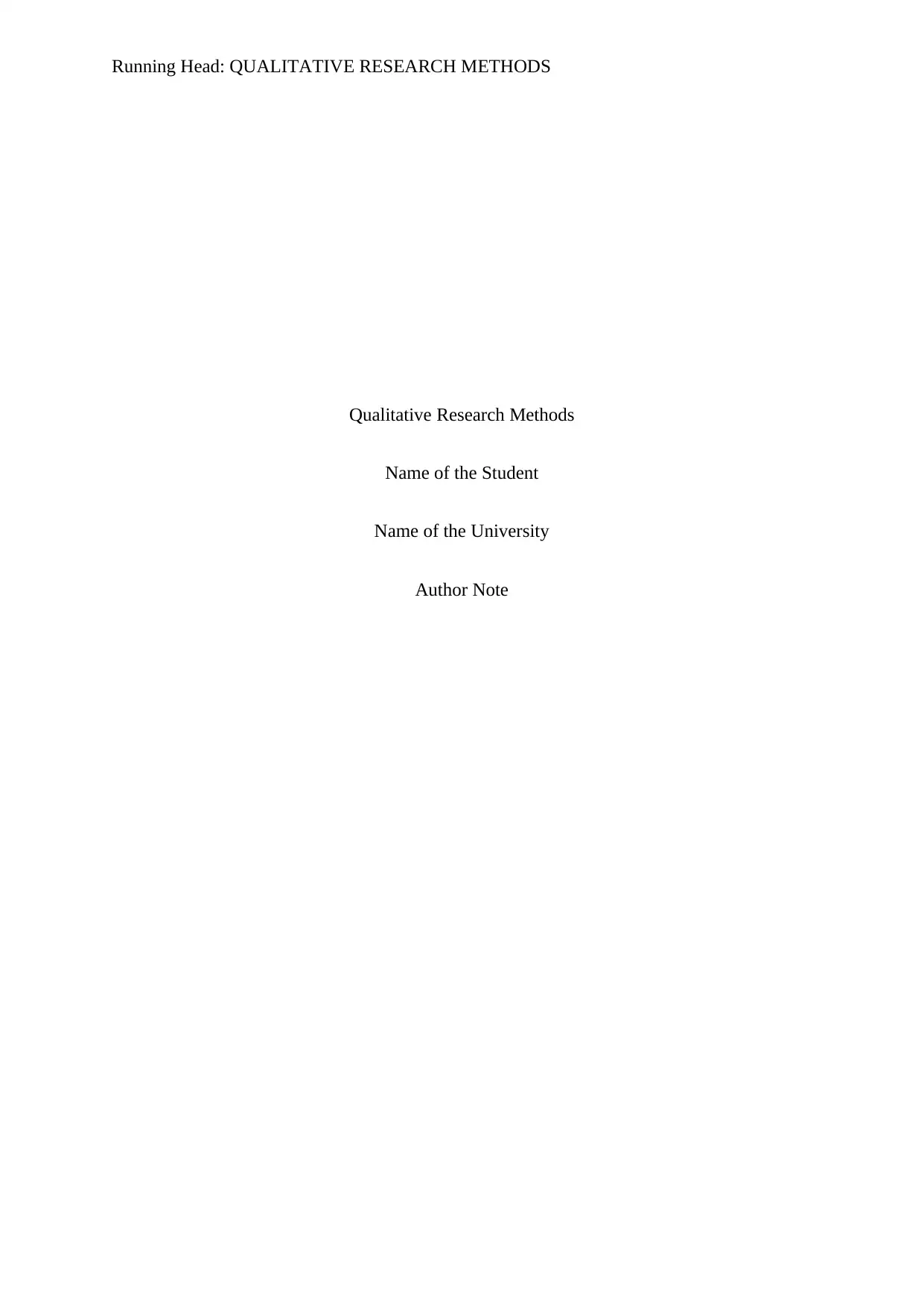
Running Head: QUALITATIVE RESEARCH METHODS
Qualitative Research Methods
Name of the Student
Name of the University
Author Note
Qualitative Research Methods
Name of the Student
Name of the University
Author Note
Paraphrase This Document
Need a fresh take? Get an instant paraphrase of this document with our AI Paraphraser
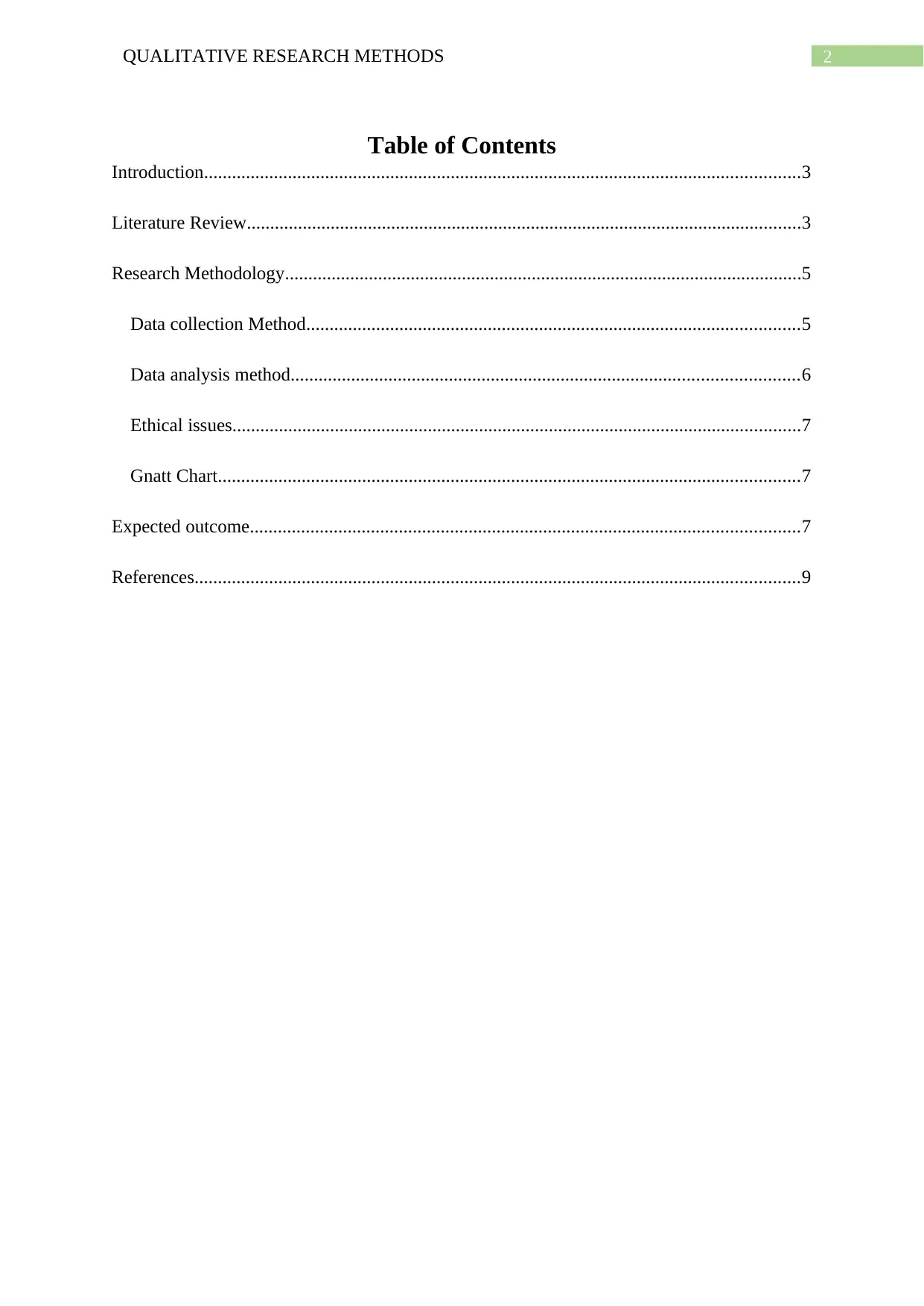
2QUALITATIVE RESEARCH METHODS
Table of Contents
Introduction................................................................................................................................3
Literature Review.......................................................................................................................3
Research Methodology...............................................................................................................5
Data collection Method..........................................................................................................5
Data analysis method.............................................................................................................6
Ethical issues..........................................................................................................................7
Gnatt Chart.............................................................................................................................7
Expected outcome......................................................................................................................7
References..................................................................................................................................9
Table of Contents
Introduction................................................................................................................................3
Literature Review.......................................................................................................................3
Research Methodology...............................................................................................................5
Data collection Method..........................................................................................................5
Data analysis method.............................................................................................................6
Ethical issues..........................................................................................................................7
Gnatt Chart.............................................................................................................................7
Expected outcome......................................................................................................................7
References..................................................................................................................................9
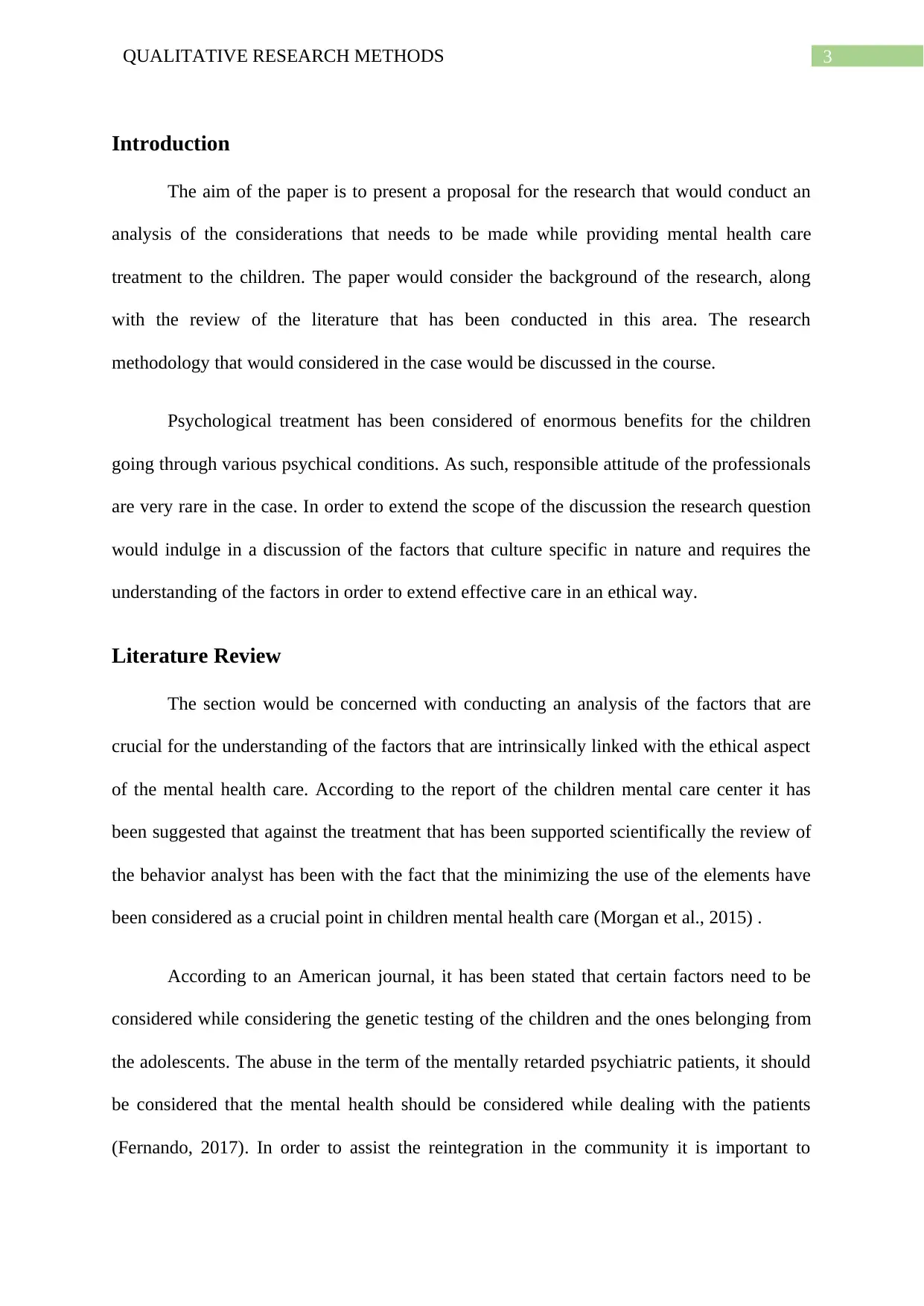
3QUALITATIVE RESEARCH METHODS
Introduction
The aim of the paper is to present a proposal for the research that would conduct an
analysis of the considerations that needs to be made while providing mental health care
treatment to the children. The paper would consider the background of the research, along
with the review of the literature that has been conducted in this area. The research
methodology that would considered in the case would be discussed in the course.
Psychological treatment has been considered of enormous benefits for the children
going through various psychical conditions. As such, responsible attitude of the professionals
are very rare in the case. In order to extend the scope of the discussion the research question
would indulge in a discussion of the factors that culture specific in nature and requires the
understanding of the factors in order to extend effective care in an ethical way.
Literature Review
The section would be concerned with conducting an analysis of the factors that are
crucial for the understanding of the factors that are intrinsically linked with the ethical aspect
of the mental health care. According to the report of the children mental care center it has
been suggested that against the treatment that has been supported scientifically the review of
the behavior analyst has been with the fact that the minimizing the use of the elements have
been considered as a crucial point in children mental health care (Morgan et al., 2015) .
According to an American journal, it has been stated that certain factors need to be
considered while considering the genetic testing of the children and the ones belonging from
the adolescents. The abuse in the term of the mentally retarded psychiatric patients, it should
be considered that the mental health should be considered while dealing with the patients
(Fernando, 2017). In order to assist the reintegration in the community it is important to
Introduction
The aim of the paper is to present a proposal for the research that would conduct an
analysis of the considerations that needs to be made while providing mental health care
treatment to the children. The paper would consider the background of the research, along
with the review of the literature that has been conducted in this area. The research
methodology that would considered in the case would be discussed in the course.
Psychological treatment has been considered of enormous benefits for the children
going through various psychical conditions. As such, responsible attitude of the professionals
are very rare in the case. In order to extend the scope of the discussion the research question
would indulge in a discussion of the factors that culture specific in nature and requires the
understanding of the factors in order to extend effective care in an ethical way.
Literature Review
The section would be concerned with conducting an analysis of the factors that are
crucial for the understanding of the factors that are intrinsically linked with the ethical aspect
of the mental health care. According to the report of the children mental care center it has
been suggested that against the treatment that has been supported scientifically the review of
the behavior analyst has been with the fact that the minimizing the use of the elements have
been considered as a crucial point in children mental health care (Morgan et al., 2015) .
According to an American journal, it has been stated that certain factors need to be
considered while considering the genetic testing of the children and the ones belonging from
the adolescents. The abuse in the term of the mentally retarded psychiatric patients, it should
be considered that the mental health should be considered while dealing with the patients
(Fernando, 2017). In order to assist the reintegration in the community it is important to
⊘ This is a preview!⊘
Do you want full access?
Subscribe today to unlock all pages.

Trusted by 1+ million students worldwide
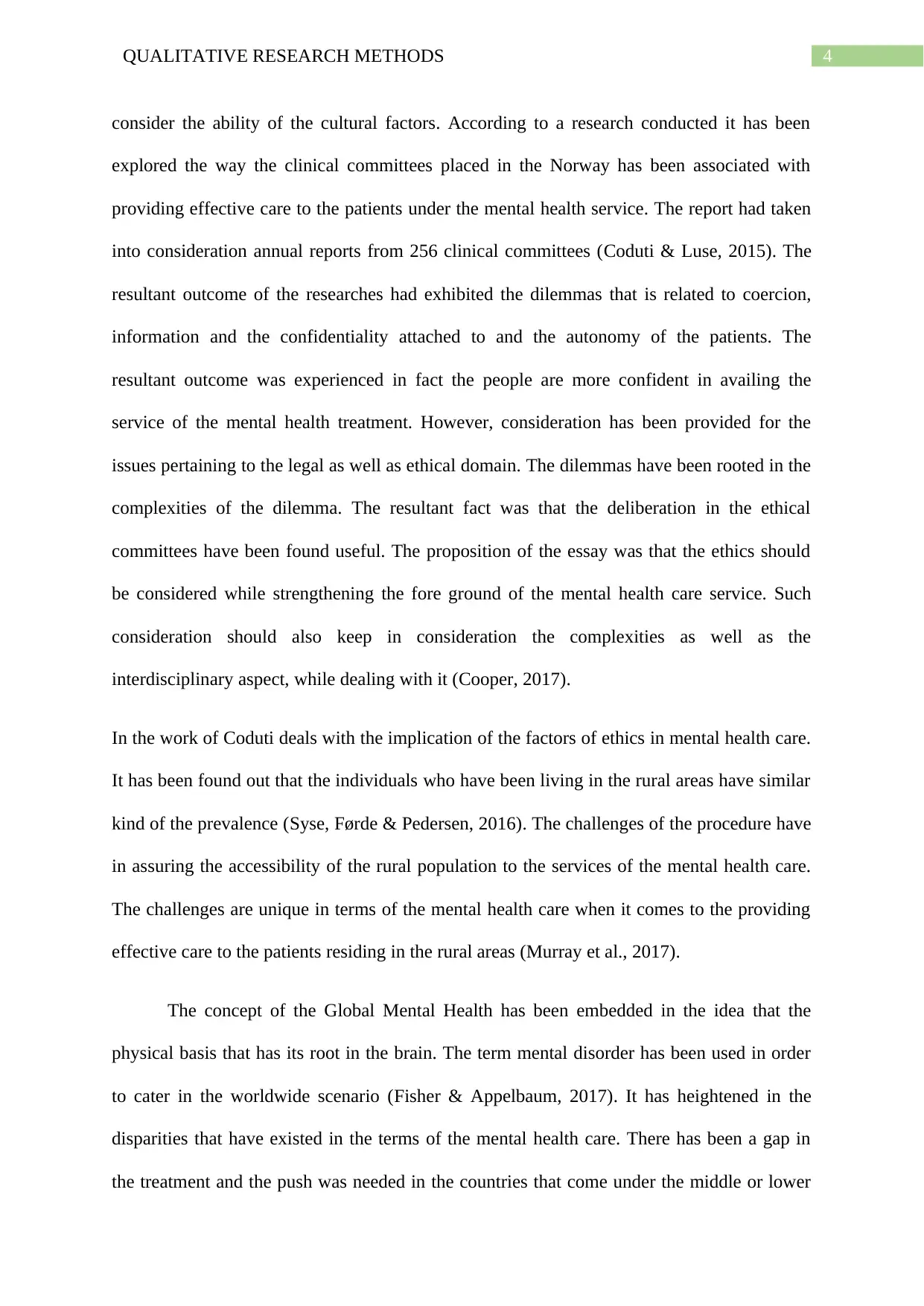
4QUALITATIVE RESEARCH METHODS
consider the ability of the cultural factors. According to a research conducted it has been
explored the way the clinical committees placed in the Norway has been associated with
providing effective care to the patients under the mental health service. The report had taken
into consideration annual reports from 256 clinical committees (Coduti & Luse, 2015). The
resultant outcome of the researches had exhibited the dilemmas that is related to coercion,
information and the confidentiality attached to and the autonomy of the patients. The
resultant outcome was experienced in fact the people are more confident in availing the
service of the mental health treatment. However, consideration has been provided for the
issues pertaining to the legal as well as ethical domain. The dilemmas have been rooted in the
complexities of the dilemma. The resultant fact was that the deliberation in the ethical
committees have been found useful. The proposition of the essay was that the ethics should
be considered while strengthening the fore ground of the mental health care service. Such
consideration should also keep in consideration the complexities as well as the
interdisciplinary aspect, while dealing with it (Cooper, 2017).
In the work of Coduti deals with the implication of the factors of ethics in mental health care.
It has been found out that the individuals who have been living in the rural areas have similar
kind of the prevalence (Syse, Førde & Pedersen, 2016). The challenges of the procedure have
in assuring the accessibility of the rural population to the services of the mental health care.
The challenges are unique in terms of the mental health care when it comes to the providing
effective care to the patients residing in the rural areas (Murray et al., 2017).
The concept of the Global Mental Health has been embedded in the idea that the
physical basis that has its root in the brain. The term mental disorder has been used in order
to cater in the worldwide scenario (Fisher & Appelbaum, 2017). It has heightened in the
disparities that have existed in the terms of the mental health care. There has been a gap in
the treatment and the push was needed in the countries that come under the middle or lower
consider the ability of the cultural factors. According to a research conducted it has been
explored the way the clinical committees placed in the Norway has been associated with
providing effective care to the patients under the mental health service. The report had taken
into consideration annual reports from 256 clinical committees (Coduti & Luse, 2015). The
resultant outcome of the researches had exhibited the dilemmas that is related to coercion,
information and the confidentiality attached to and the autonomy of the patients. The
resultant outcome was experienced in fact the people are more confident in availing the
service of the mental health treatment. However, consideration has been provided for the
issues pertaining to the legal as well as ethical domain. The dilemmas have been rooted in the
complexities of the dilemma. The resultant fact was that the deliberation in the ethical
committees have been found useful. The proposition of the essay was that the ethics should
be considered while strengthening the fore ground of the mental health care service. Such
consideration should also keep in consideration the complexities as well as the
interdisciplinary aspect, while dealing with it (Cooper, 2017).
In the work of Coduti deals with the implication of the factors of ethics in mental health care.
It has been found out that the individuals who have been living in the rural areas have similar
kind of the prevalence (Syse, Førde & Pedersen, 2016). The challenges of the procedure have
in assuring the accessibility of the rural population to the services of the mental health care.
The challenges are unique in terms of the mental health care when it comes to the providing
effective care to the patients residing in the rural areas (Murray et al., 2017).
The concept of the Global Mental Health has been embedded in the idea that the
physical basis that has its root in the brain. The term mental disorder has been used in order
to cater in the worldwide scenario (Fisher & Appelbaum, 2017). It has heightened in the
disparities that have existed in the terms of the mental health care. There has been a gap in
the treatment and the push was needed in the countries that come under the middle or lower
Paraphrase This Document
Need a fresh take? Get an instant paraphrase of this document with our AI Paraphraser
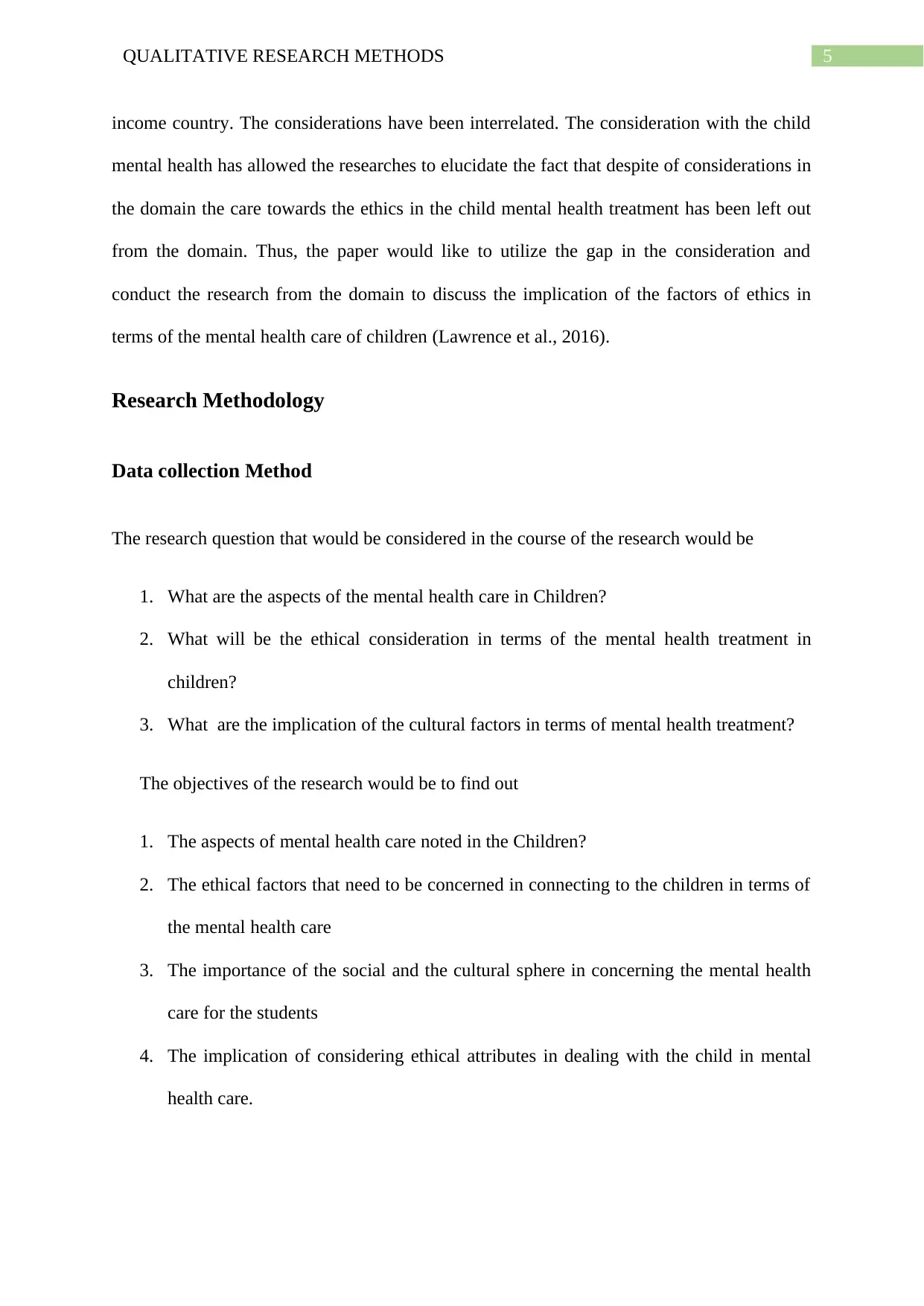
5QUALITATIVE RESEARCH METHODS
income country. The considerations have been interrelated. The consideration with the child
mental health has allowed the researches to elucidate the fact that despite of considerations in
the domain the care towards the ethics in the child mental health treatment has been left out
from the domain. Thus, the paper would like to utilize the gap in the consideration and
conduct the research from the domain to discuss the implication of the factors of ethics in
terms of the mental health care of children (Lawrence et al., 2016).
Research Methodology
Data collection Method
The research question that would be considered in the course of the research would be
1. What are the aspects of the mental health care in Children?
2. What will be the ethical consideration in terms of the mental health treatment in
children?
3. What are the implication of the cultural factors in terms of mental health treatment?
The objectives of the research would be to find out
1. The aspects of mental health care noted in the Children?
2. The ethical factors that need to be concerned in connecting to the children in terms of
the mental health care
3. The importance of the social and the cultural sphere in concerning the mental health
care for the students
4. The implication of considering ethical attributes in dealing with the child in mental
health care.
income country. The considerations have been interrelated. The consideration with the child
mental health has allowed the researches to elucidate the fact that despite of considerations in
the domain the care towards the ethics in the child mental health treatment has been left out
from the domain. Thus, the paper would like to utilize the gap in the consideration and
conduct the research from the domain to discuss the implication of the factors of ethics in
terms of the mental health care of children (Lawrence et al., 2016).
Research Methodology
Data collection Method
The research question that would be considered in the course of the research would be
1. What are the aspects of the mental health care in Children?
2. What will be the ethical consideration in terms of the mental health treatment in
children?
3. What are the implication of the cultural factors in terms of mental health treatment?
The objectives of the research would be to find out
1. The aspects of mental health care noted in the Children?
2. The ethical factors that need to be concerned in connecting to the children in terms of
the mental health care
3. The importance of the social and the cultural sphere in concerning the mental health
care for the students
4. The implication of considering ethical attributes in dealing with the child in mental
health care.
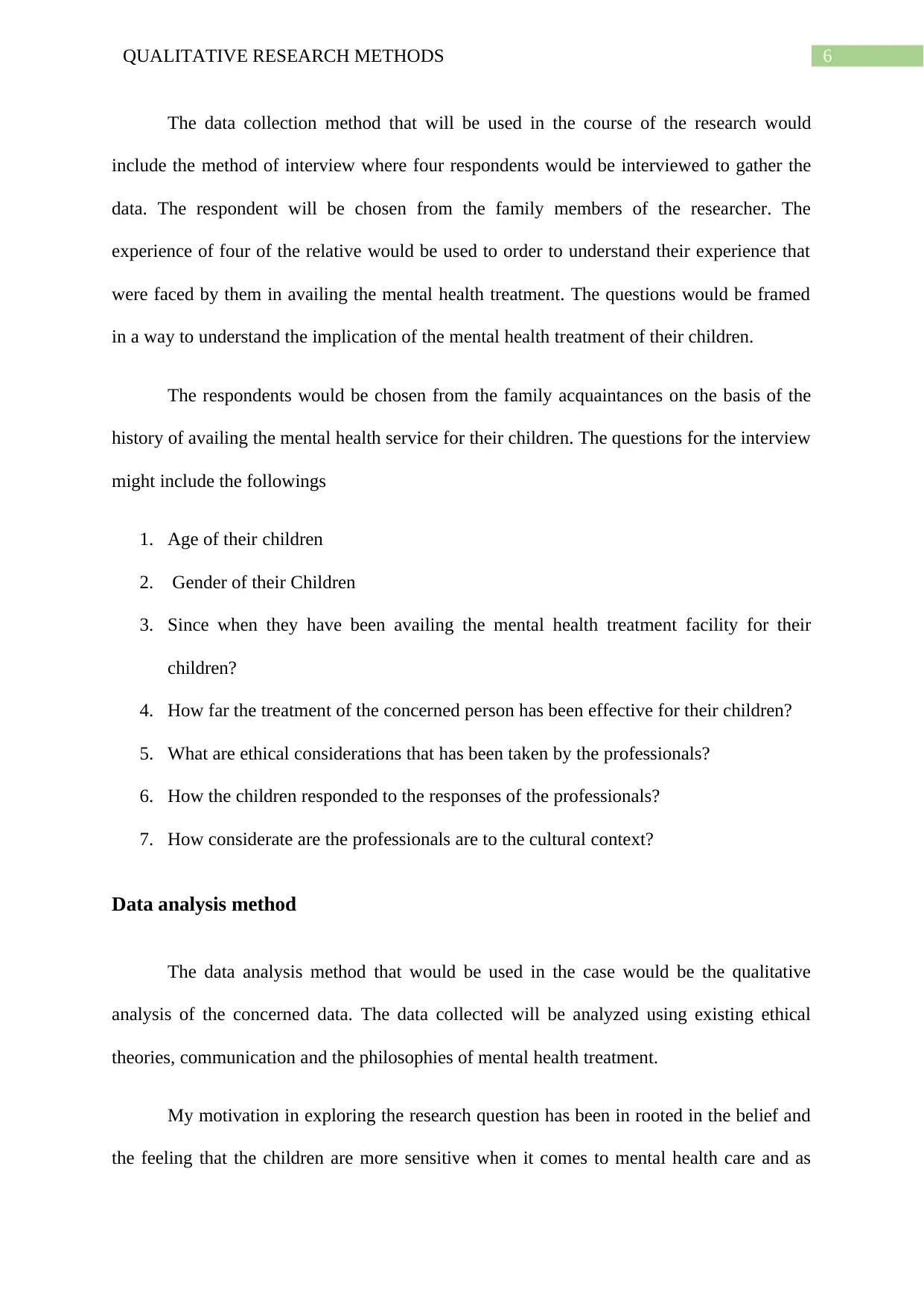
6QUALITATIVE RESEARCH METHODS
The data collection method that will be used in the course of the research would
include the method of interview where four respondents would be interviewed to gather the
data. The respondent will be chosen from the family members of the researcher. The
experience of four of the relative would be used to order to understand their experience that
were faced by them in availing the mental health treatment. The questions would be framed
in a way to understand the implication of the mental health treatment of their children.
The respondents would be chosen from the family acquaintances on the basis of the
history of availing the mental health service for their children. The questions for the interview
might include the followings
1. Age of their children
2. Gender of their Children
3. Since when they have been availing the mental health treatment facility for their
children?
4. How far the treatment of the concerned person has been effective for their children?
5. What are ethical considerations that has been taken by the professionals?
6. How the children responded to the responses of the professionals?
7. How considerate are the professionals are to the cultural context?
Data analysis method
The data analysis method that would be used in the case would be the qualitative
analysis of the concerned data. The data collected will be analyzed using existing ethical
theories, communication and the philosophies of mental health treatment.
My motivation in exploring the research question has been in rooted in the belief and
the feeling that the children are more sensitive when it comes to mental health care and as
The data collection method that will be used in the course of the research would
include the method of interview where four respondents would be interviewed to gather the
data. The respondent will be chosen from the family members of the researcher. The
experience of four of the relative would be used to order to understand their experience that
were faced by them in availing the mental health treatment. The questions would be framed
in a way to understand the implication of the mental health treatment of their children.
The respondents would be chosen from the family acquaintances on the basis of the
history of availing the mental health service for their children. The questions for the interview
might include the followings
1. Age of their children
2. Gender of their Children
3. Since when they have been availing the mental health treatment facility for their
children?
4. How far the treatment of the concerned person has been effective for their children?
5. What are ethical considerations that has been taken by the professionals?
6. How the children responded to the responses of the professionals?
7. How considerate are the professionals are to the cultural context?
Data analysis method
The data analysis method that would be used in the case would be the qualitative
analysis of the concerned data. The data collected will be analyzed using existing ethical
theories, communication and the philosophies of mental health treatment.
My motivation in exploring the research question has been in rooted in the belief and
the feeling that the children are more sensitive when it comes to mental health care and as
⊘ This is a preview!⊘
Do you want full access?
Subscribe today to unlock all pages.

Trusted by 1+ million students worldwide
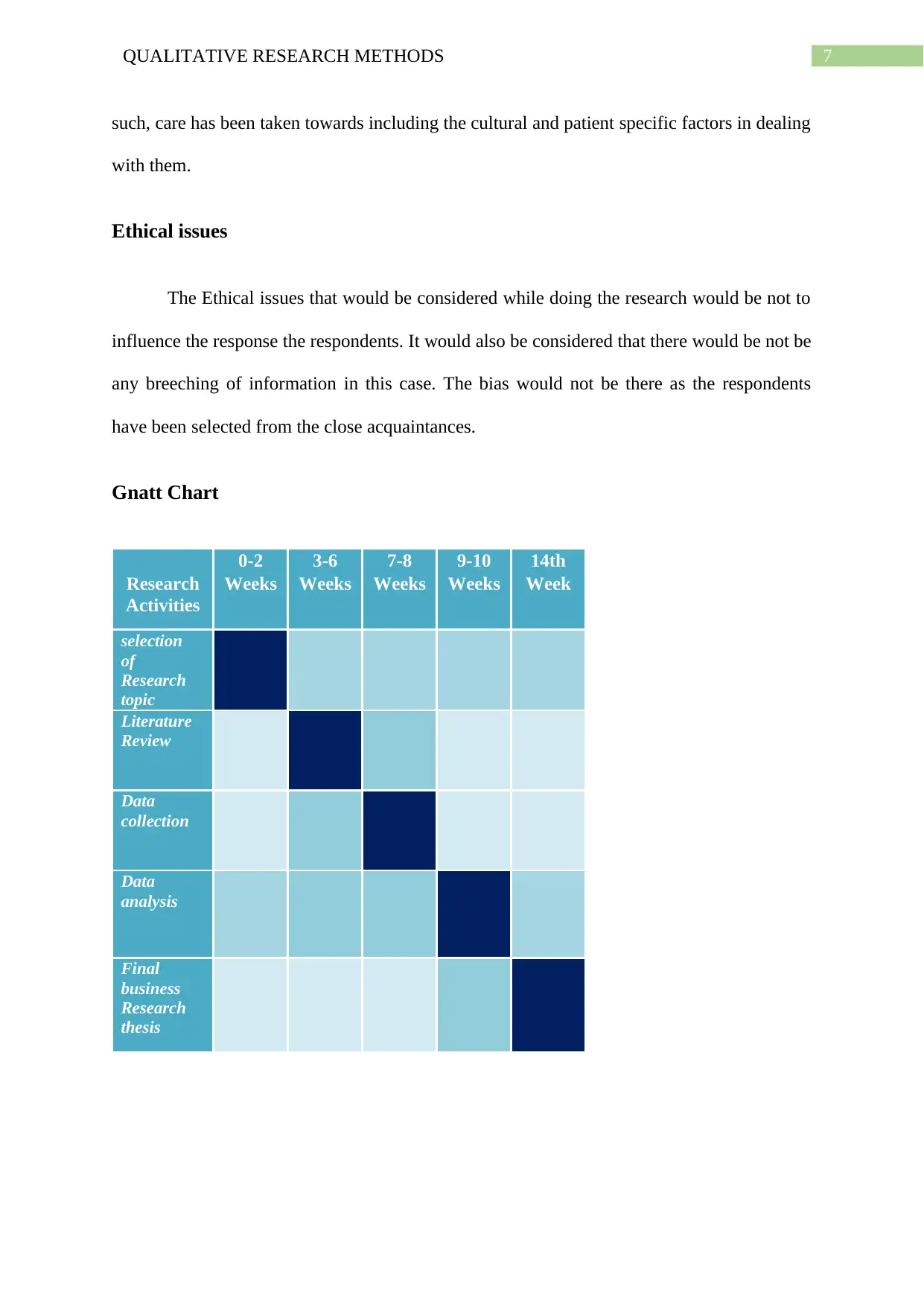
7QUALITATIVE RESEARCH METHODS
such, care has been taken towards including the cultural and patient specific factors in dealing
with them.
Ethical issues
The Ethical issues that would be considered while doing the research would be not to
influence the response the respondents. It would also be considered that there would be not be
any breeching of information in this case. The bias would not be there as the respondents
have been selected from the close acquaintances.
Gnatt Chart
0-2 3-6 7-8 9-10 14th
Research
Activities
Weeks Weeks Weeks Weeks Week
selection
of
Research
topic
Literature
Review
Data
collection
Data
analysis
Final
business
Research
thesis
such, care has been taken towards including the cultural and patient specific factors in dealing
with them.
Ethical issues
The Ethical issues that would be considered while doing the research would be not to
influence the response the respondents. It would also be considered that there would be not be
any breeching of information in this case. The bias would not be there as the respondents
have been selected from the close acquaintances.
Gnatt Chart
0-2 3-6 7-8 9-10 14th
Research
Activities
Weeks Weeks Weeks Weeks Week
selection
of
Research
topic
Literature
Review
Data
collection
Data
analysis
Final
business
Research
thesis
Paraphrase This Document
Need a fresh take? Get an instant paraphrase of this document with our AI Paraphraser
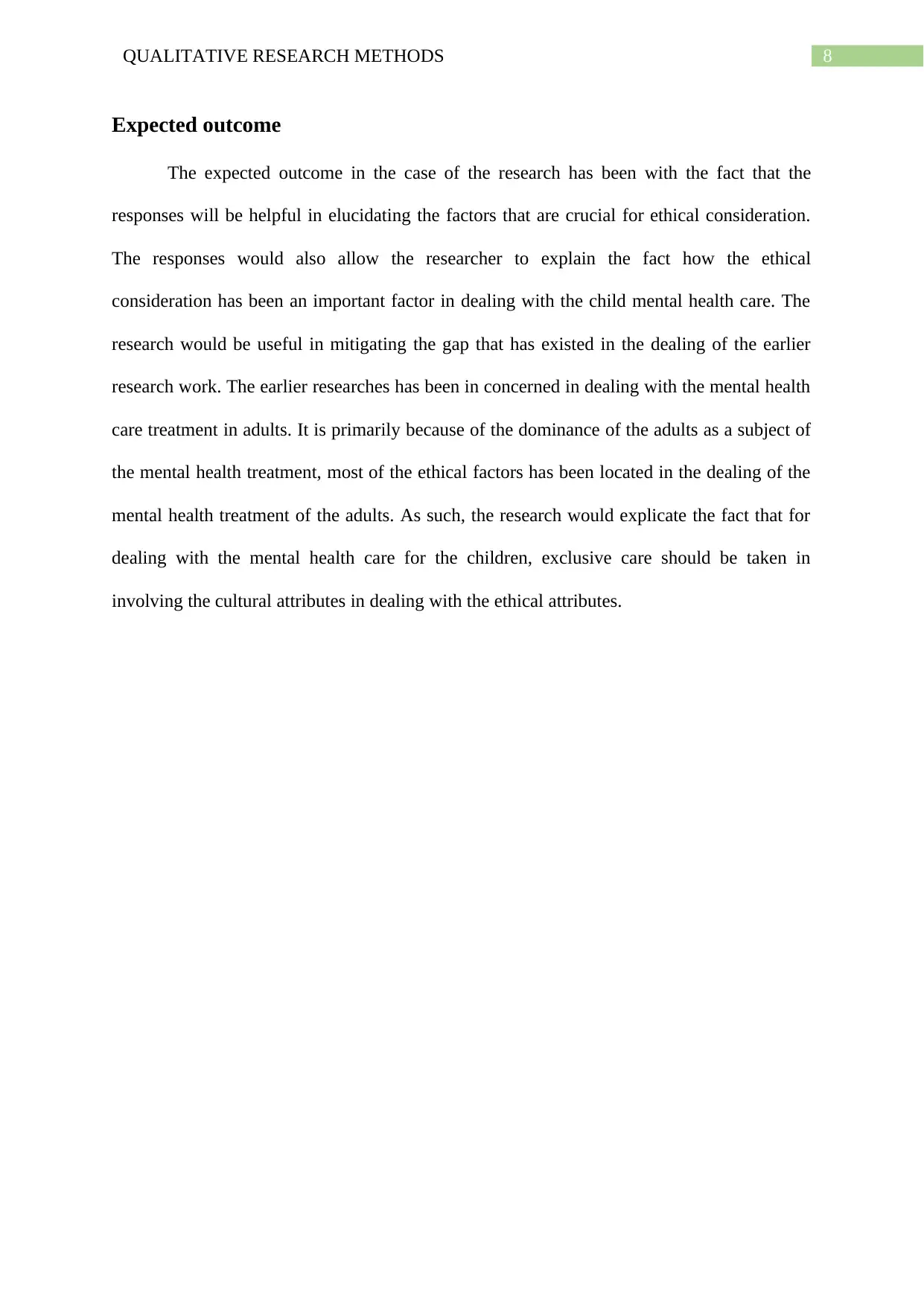
8QUALITATIVE RESEARCH METHODS
Expected outcome
The expected outcome in the case of the research has been with the fact that the
responses will be helpful in elucidating the factors that are crucial for ethical consideration.
The responses would also allow the researcher to explain the fact how the ethical
consideration has been an important factor in dealing with the child mental health care. The
research would be useful in mitigating the gap that has existed in the dealing of the earlier
research work. The earlier researches has been in concerned in dealing with the mental health
care treatment in adults. It is primarily because of the dominance of the adults as a subject of
the mental health treatment, most of the ethical factors has been located in the dealing of the
mental health treatment of the adults. As such, the research would explicate the fact that for
dealing with the mental health care for the children, exclusive care should be taken in
involving the cultural attributes in dealing with the ethical attributes.
Expected outcome
The expected outcome in the case of the research has been with the fact that the
responses will be helpful in elucidating the factors that are crucial for ethical consideration.
The responses would also allow the researcher to explain the fact how the ethical
consideration has been an important factor in dealing with the child mental health care. The
research would be useful in mitigating the gap that has existed in the dealing of the earlier
research work. The earlier researches has been in concerned in dealing with the mental health
care treatment in adults. It is primarily because of the dominance of the adults as a subject of
the mental health treatment, most of the ethical factors has been located in the dealing of the
mental health treatment of the adults. As such, the research would explicate the fact that for
dealing with the mental health care for the children, exclusive care should be taken in
involving the cultural attributes in dealing with the ethical attributes.
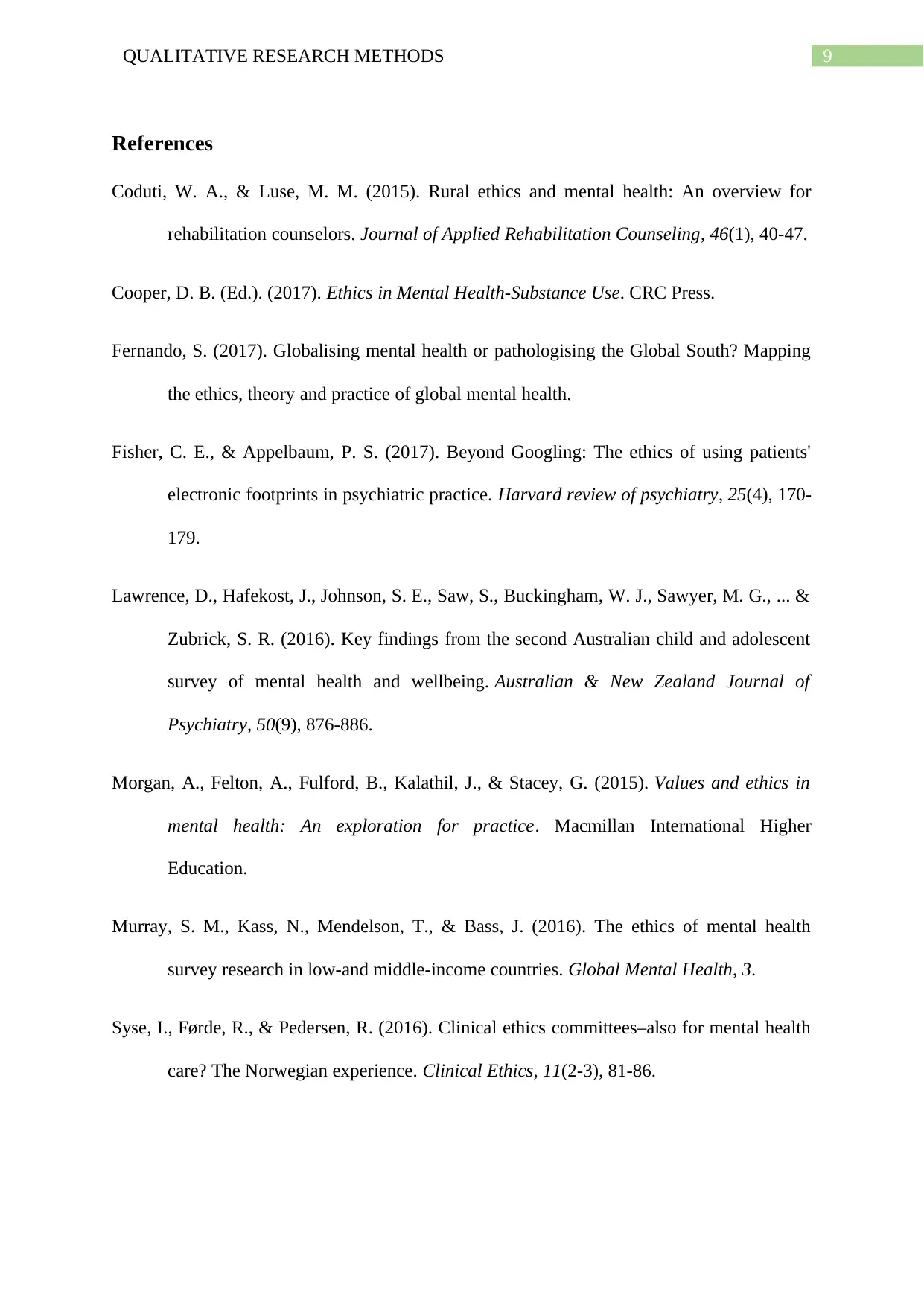
9QUALITATIVE RESEARCH METHODS
References
Coduti, W. A., & Luse, M. M. (2015). Rural ethics and mental health: An overview for
rehabilitation counselors. Journal of Applied Rehabilitation Counseling, 46(1), 40-47.
Cooper, D. B. (Ed.). (2017). Ethics in Mental Health-Substance Use. CRC Press.
Fernando, S. (2017). Globalising mental health or pathologising the Global South? Mapping
the ethics, theory and practice of global mental health.
Fisher, C. E., & Appelbaum, P. S. (2017). Beyond Googling: The ethics of using patients'
electronic footprints in psychiatric practice. Harvard review of psychiatry, 25(4), 170-
179.
Lawrence, D., Hafekost, J., Johnson, S. E., Saw, S., Buckingham, W. J., Sawyer, M. G., ... &
Zubrick, S. R. (2016). Key findings from the second Australian child and adolescent
survey of mental health and wellbeing. Australian & New Zealand Journal of
Psychiatry, 50(9), 876-886.
Morgan, A., Felton, A., Fulford, B., Kalathil, J., & Stacey, G. (2015). Values and ethics in
mental health: An exploration for practice. Macmillan International Higher
Education.
Murray, S. M., Kass, N., Mendelson, T., & Bass, J. (2016). The ethics of mental health
survey research in low-and middle-income countries. Global Mental Health, 3.
Syse, I., Førde, R., & Pedersen, R. (2016). Clinical ethics committees–also for mental health
care? The Norwegian experience. Clinical Ethics, 11(2-3), 81-86.
References
Coduti, W. A., & Luse, M. M. (2015). Rural ethics and mental health: An overview for
rehabilitation counselors. Journal of Applied Rehabilitation Counseling, 46(1), 40-47.
Cooper, D. B. (Ed.). (2017). Ethics in Mental Health-Substance Use. CRC Press.
Fernando, S. (2017). Globalising mental health or pathologising the Global South? Mapping
the ethics, theory and practice of global mental health.
Fisher, C. E., & Appelbaum, P. S. (2017). Beyond Googling: The ethics of using patients'
electronic footprints in psychiatric practice. Harvard review of psychiatry, 25(4), 170-
179.
Lawrence, D., Hafekost, J., Johnson, S. E., Saw, S., Buckingham, W. J., Sawyer, M. G., ... &
Zubrick, S. R. (2016). Key findings from the second Australian child and adolescent
survey of mental health and wellbeing. Australian & New Zealand Journal of
Psychiatry, 50(9), 876-886.
Morgan, A., Felton, A., Fulford, B., Kalathil, J., & Stacey, G. (2015). Values and ethics in
mental health: An exploration for practice. Macmillan International Higher
Education.
Murray, S. M., Kass, N., Mendelson, T., & Bass, J. (2016). The ethics of mental health
survey research in low-and middle-income countries. Global Mental Health, 3.
Syse, I., Førde, R., & Pedersen, R. (2016). Clinical ethics committees–also for mental health
care? The Norwegian experience. Clinical Ethics, 11(2-3), 81-86.
⊘ This is a preview!⊘
Do you want full access?
Subscribe today to unlock all pages.

Trusted by 1+ million students worldwide
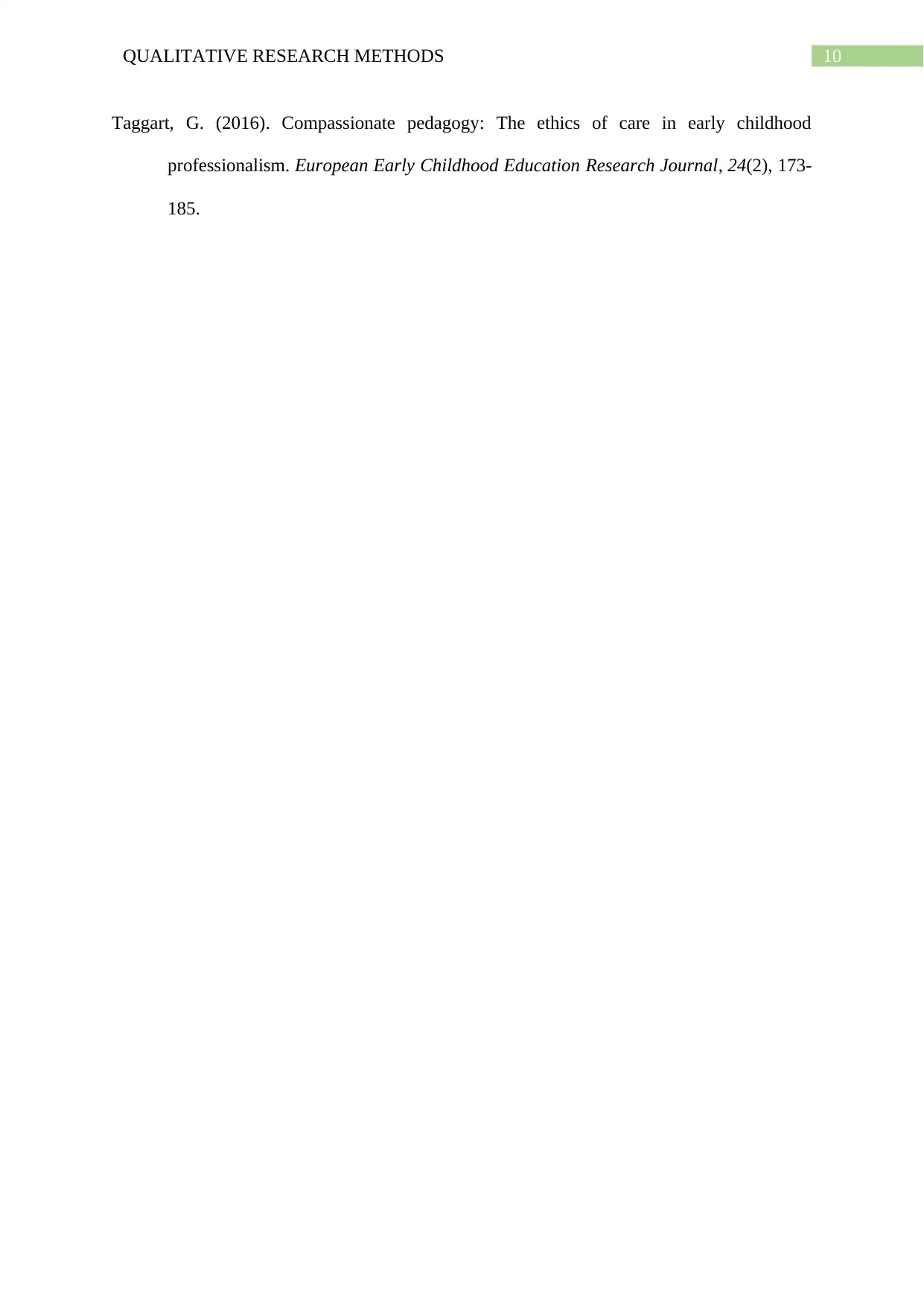
10QUALITATIVE RESEARCH METHODS
Taggart, G. (2016). Compassionate pedagogy: The ethics of care in early childhood
professionalism. European Early Childhood Education Research Journal, 24(2), 173-
185.
Taggart, G. (2016). Compassionate pedagogy: The ethics of care in early childhood
professionalism. European Early Childhood Education Research Journal, 24(2), 173-
185.
1 out of 10
Related Documents
Your All-in-One AI-Powered Toolkit for Academic Success.
+13062052269
info@desklib.com
Available 24*7 on WhatsApp / Email
![[object Object]](/_next/static/media/star-bottom.7253800d.svg)
Unlock your academic potential
Copyright © 2020–2025 A2Z Services. All Rights Reserved. Developed and managed by ZUCOL.





